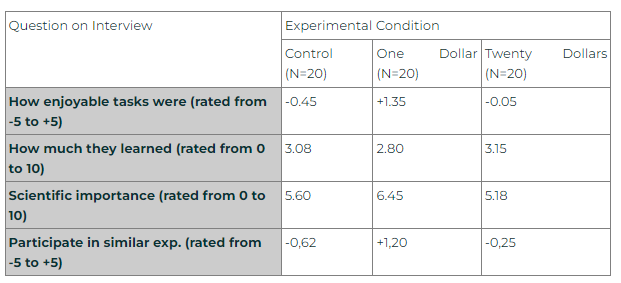Claim
Small rewards are much better drivers of motivation than the big ones.
Study
Festinger & Carlsmith's Study (1954)
A total of 71 participants of the experiment were asked to do a very boring task.
Half of them got a normal description of this task, the second half had got it described as something very enjoyable.
After a very long hour of the test, some of the participants were asked to finish (N=20) = control group.
The rest was split into 2 groups:
The first group was offered just 1$ to take the position of the experimenter and try to describe the task like it is something joyful. The second group was offered 20$ for the same ask.
Festinger, L. and Carlsmith, J. M. (1959). "Cognitive consequences of forced compliance". Journal of Abnormal and Social Psychology, 58, 203-211.
Results

Turned out that after the study, the group that got offered 1$ found the task much more enjoyable, than the group that got 20$ or even the control group. Moreover, only the 1$ created a bias, where participant would say they would participate in similar experiment again.
Conclusion
Small rewards work so much better because of the so-called cognitive dissonance effect.
We are not rational. We are rationalizers. Getting offered low reward, forces our brain to rationalize our actions, and creates new internal "why", that then can be a long-lasting source of motivation.
Useful reads
https://www.psychologytoday.com/ca/blog/unconscious-branding/202210/why-small-incentives-can-work-better-big-ones - provides more examples of studies on small rewards
https://explorable.com/cognitive-dissonance - discusses the above mentioned research and general term of cognitive dissonance